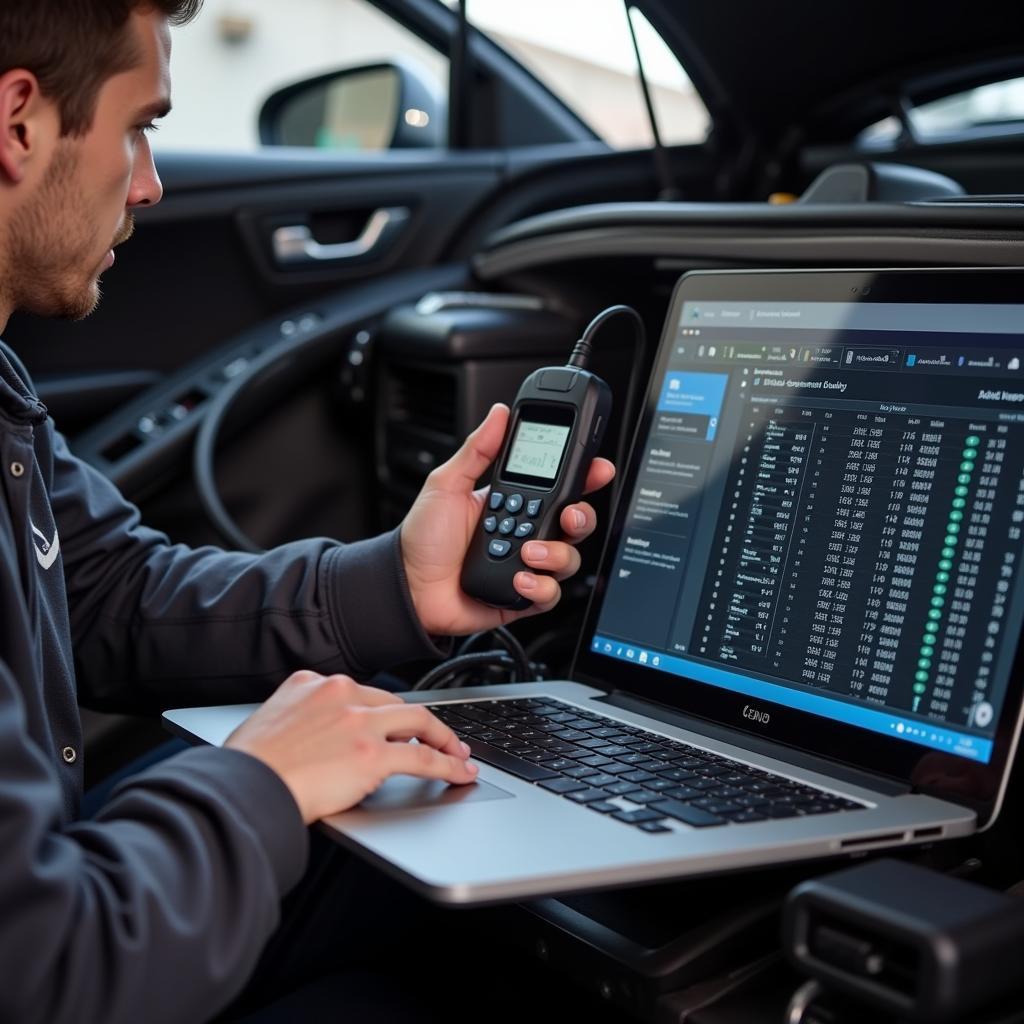A full diagnostic test for your car is crucial for maintaining its health and performance. Understanding what a full diagnostic test entails, its benefits, and how to choose the right service can save you time, money, and potential headaches down the road. This article provides comprehensive information on everything related to Full Diagnostic Test Cars.
What is a Full Diagnostic Test for Cars?
A full diagnostic test, also known as a comprehensive diagnostic scan, goes beyond a simple code read. It utilizes advanced automotive diagnostic tools to delve deep into your car’s various systems, assessing their functionality and identifying potential issues. This involves checking the engine control unit (ECU), transmission, ABS, airbags, and other electronic systems. The test provides a detailed report outlining any faults, potential problems, and recommended repairs.
Why is a Full Diagnostic Test Important?
Regular full diagnostic tests are a cornerstone of preventative car maintenance. They can uncover hidden problems before they escalate into major repairs, saving you significant money in the long run. Early detection through diagnostic testing can also prevent breakdowns, ensuring your safety on the road.
Benefits of Regular Diagnostic Testing
- Early Problem Detection: A full diagnostic test can identify minor issues before they become major problems, often before you even notice any symptoms.
- Preventative Maintenance: Regular testing allows you to address potential issues proactively, extending the life of your vehicle’s components.
- Improved Safety: By identifying problems with safety systems like ABS and airbags, diagnostic testing ensures your car is safe to drive.
- Enhanced Performance: Identifying and resolving performance issues can improve fuel efficiency and overall driving experience.
- Resale Value: A well-maintained car with a history of regular diagnostic tests has a higher resale value.
What Does a Full Diagnostic Test Check?
A comprehensive diagnostic scan examines several crucial systems in your car, including:
- Engine Control Unit (ECU): This is the brain of your car, controlling various engine functions. The test checks for any faults or errors in the ECU.
- Transmission: The test assesses the transmission’s performance, checking for slippage, gear shifting problems, and other issues.
- Anti-lock Braking System (ABS): The diagnostic test verifies the functionality of the ABS, ensuring it’s working correctly to prevent wheel lockup during braking.
- Airbag System: The test checks the airbag system for any faults, ensuring it will deploy correctly in the event of a collision.
- Other Electronic Systems: The diagnostic scan also checks various other electronic systems, including the body control module, power windows, and climate control.
How to Choose a Car Diagnostic Service
Choosing the right diagnostic service is vital to ensure accurate results and effective repairs. Look for a reputable service provider with experienced technicians and advanced diagnostic equipment.
Factors to Consider When Choosing a Service
- Experience and Expertise: Choose a service provider with certified technicians who specialize in car diagnostics.
- Equipment and Technology: Ensure they use the latest diagnostic equipment and software to provide accurate and comprehensive results.
- Reputation and Reviews: Check online reviews and testimonials to assess the service provider’s reputation and customer satisfaction.
- Price and Transparency: Compare prices and ensure the service provider offers transparent pricing with no hidden fees.
 Mechanic Performing a Full Diagnostic Car Test
Mechanic Performing a Full Diagnostic Car Test
How Much Does a Full Diagnostic Test Cost?
The cost of a full diagnostic test varies depending on the service provider, location, and the complexity of the test. On average, you can expect to pay between $80 and $150 for a comprehensive diagnostic scan.
Frequently Asked Questions about Full Diagnostic Test Cars
- How often should I get a full diagnostic test? It’s recommended to get a full diagnostic test at least once a year or as part of your regular maintenance schedule.
- Can I perform a full diagnostic test myself? While some basic diagnostic tools are available for DIYers, a full diagnostic test requires specialized equipment and expertise best left to professionals.
- What happens after a full diagnostic test? The technician will provide you with a detailed report outlining any identified issues and recommended repairs.
- Will a full diagnostic test fix the problems? No, the diagnostic test only identifies problems. Repairs will need to be performed separately.
- Is a full diagnostic test necessary before buying a used car? Absolutely! A full diagnostic test is highly recommended before purchasing a used car to identify any potential problems and avoid costly surprises later.
- Can a full diagnostic test detect all car problems? While a full diagnostic test can detect a wide range of issues, it’s not foolproof and may not identify every potential problem.
- How long does a full diagnostic test take? A full diagnostic test typically takes between 30 minutes to an hour.
Conclusion
A full diagnostic test cars is an essential part of maintaining your car’s health, performance, and safety. By understanding the importance of these tests and choosing the right service provider, you can ensure your vehicle stays in top condition for years to come. Don’t wait for problems to arise; invest in regular diagnostic tests for peace of mind and long-term savings.
 Modern Car Diagnostic Software Interface
Modern Car Diagnostic Software Interface
For expert assistance and personalized solutions for all your car diagnostic needs, contact us via WhatsApp: +1(641)206-8880 or Email: [email protected]. Our 24/7 customer service team is ready to help.

Leave a Reply